Posts Tagged ‘“Boston product liability lawyers”’
DePuy Hip Implant Recall Leads Insurers to Seek Recovery
Medical insurance companies are alerting patients who have defective all-metal hip implants that they will seek to recover expenses from any settlement money which patients receive. Medicare is also expected to try and recover its costs.
Thousands of patients have been affected by recent recalls of all-metal hip implants and are expected to seek compensation from manufacturers. Although insurance companies, by statute or contract, often have the right to recover some of their costs, it is unusual for companies to be so assertive for medical device failures. The aggressive actions being taken by the insurers reflect their awareness of just how expensive these defective products are becoming.
In August 2010, DePuy recalled the ASR XL Acetabular System. The hip implant is defective because it causes friction between the metallic ball and socket components, which are implanted to replace the femur and acetabulum.
The recalled DePuy hip implants can wear down and produce a substantial amount of metallic particles in patients’ bloodstreams. Patients reported signs of metallosis, including pain, swelling, problems walking and rashes. Other serious problems may include bone fractures, joint inflammation, hip dislocation and damage to the tissue, hip implant loosening, nerves and muscles near the implant.
DePuy recalled the defective hip implants after the Food and Drug Administration (FDA) received about 400 complaints in two years from patients. That number has grown significantly following the recall. In just the first six months of 2011, the FDA received more than 5,000 reports about problems with all-metal hip implants, according to an analysis by The New York Times. DePuy hip implants accounted for 75 percent of the complaints.
It is still unclear how many patients have been affected by defective metal hip implants. The New York Times reports one estimate that 500,000 patients have received an all-metal replacement hip.
The newspaper reports another estimate that 250,000 hip replacements are performed in the United States each year. Until recently all-metal hip implants accounted for nearly one-third of these procedures.
As of October 2011, 3,500 patients filed lawsuits against DePuy in connection with last year’s recall. DePuy also faces over 560 lawsuits in connection with the Pinnacle, another defective all-metal hip implant.
More lawsuits are expected against DePuy and other manufacturers as patients start experiencing pain and requiring corrective surgery. This procedure can be painful, require substantial post-operation bed rest and treatment and cost hundreds of thousands of dollars.
Click here to read more about all-metal hip implants in the New York Times.
Read More
Infant’s Death Prompts Walmart To Remove Baby Formula
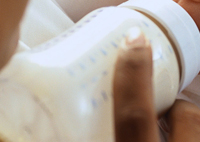 Walmart pulled Enfamil baby formula from more than 3,000 stores this week after a newborn’s death in Missouri.
Walmart pulled Enfamil baby formula from more than 3,000 stores this week after a newborn’s death in Missouri.
Walmart voluntarily removed the cans of Enfamil Newborn from its store shelves on Monday night. The baby formula is under investigation by health officials after the 10-day-old baby boy’s death Sunday from Cronobacter, a bacteria linked to newborn illness and milk-based powder baby formula. The formula had been used by the baby’s family. A second infant was infected by the bacteria, but recovered.
The 12.5-ounce cans of Enfamil Newborn are marked with the lot number ZPIK7G. This includes at the chain’s 35 stores, 12 super centers and 2 Sam’s Club locations in Massachusetts.
The formula has been sent for testing to the U.S. Centers for Disease Control and Prevention (CDC) and the Food and Drug Administration (FDA). In the meantime, the Missouri Department of Heath and Senior Services is urging consumers who purchased the formula to return it to the store or discard it.
The manufacturer Mead Johnson said that the batch of infant formula used by the child’s family tested negative for Cronobacter when it was produced and packaged.
Mead Johnson and Walmart representatives say the companies are working with authorities. Neither of the companies has implemented a formal product recall. The government has not requested one.
Click here to read a recent news article about this product liability case.
Read More
Food Recall for Ocean Spray Dried Cranberries
 As the Christmas season begins, one Massachusetts company remains bogged down in Thanksgiving, after issuing a recall for its popular dried cranberry snacks.
As the Christmas season begins, one Massachusetts company remains bogged down in Thanksgiving, after issuing a recall for its popular dried cranberry snacks.
The day after Thanksgiving, Ocean Spray of Middleboro issued a recall for four package sizes of its Original Flavor Craisins Dried Cranberries product. The company voluntarily recalled the snack because of the possibility packages contained small hair-like metal fragments. The metal fragments resulted from an equipment malfunction on a production line, a company official told Vitals, an MSNBC.com blog.
Ocean Spray said it has received no consumer complaints or injury reports. Dried cranberry snacks are a growing product line for Ocean Spray. Last summer, a company official told the New England Business Bulletin that it was planning to expand its Middleboro facility and produce a third dried cranberry product.
The following Ocean Spray Original Flavor Craisins Dried Cranberries are part of this product recall:
- 5 oz Craisins® UPC: 00293-000
- 10 oz Craisins® UPC: 29456-000 and 29464-000
- 48 oz Craisins® UPC: 00678-318
- 10 lb bulk ingredient & foodservice UPC: 03477-000
Click here to see the full list with production dates for the recalled products.
Consumers who have purchased the recalled products are advised to discard them and preserve the UPC label and best by date. They should contact the Ocean Spray Consumer Hotline at 1-800-662-3263 for a coupon replacement.
Read More
Dangerous Toy Report Details Lead, Choking Hazards
 For a quarter century, the U.S. PIRG Education Fund (U.S. PIRG) has educated the public about toy safety for the holiday shopping season.
For a quarter century, the U.S. PIRG Education Fund (U.S. PIRG) has educated the public about toy safety for the holiday shopping season.
This year, U.S. PIRG’s “Trouble In Toyland: The 26th Annual Survey of Toy Safety,” warns consumers about over a dozen potentially dangerous toys, including those with dangerous levels of lead, phthalates and cadmium. Other warnings were issued for toys posing choking and strangulation hazards as well as those that create an excessively loud noise. The Boston product liability lawyers at Breakstone, White & Gluck urge you to glance at the report’s findings before you do your holiday shopping:
Toys With Dangerous Lead Limits. Lead has been banned in paint, children’s products and cookware in the United States since 1978, but it remains a problem in toys which are imported from other countries. Between October 2010 and November 2011, nearly 200,000 toys were recalled because of excessive lead limits, U.S. PIRG reported.
This year’s U.S. PIRG review found two toys on the market with lead levels which exceed the current 300 ppm standard, one toy that exceeded the prospective 100 ppm standard and four toys that exceeded the American Academy of Pediatrics recommendation of 40 ppm. This is the limit supported by U.S. PIRG.
Phthalates in Toys. Exposure to phthalates has been linked to have adverse health effects for children in the womb, including premature delivery and reproductive defects. U.S. PIRG identified two toys with limits exceeding the amount allowed by the Consumer Product Safety Improvement Act of 2008. The two toys include the Funny Glasses, manufactured by Joking Around, and the Sleep Mask, manufactured by Claire’s. Both exceed the 1000 ppm of banned phthalate standard.
Cadmium. Cadmium is a frequent additive in children’s jewelry. In response to a legal action in September, retailers agreed to sell only products that have less than 300 ppm cadmium. U.S. PIRG found no cases of noncompliance, but urged the Consumer Product Safety Commission to proceed with setting limits for cadmium in children and toy jewelry.
Choking Hazard. Choking on toys with small parts is the leading cause of toy-related deaths and injuries. Between 1990 and 2010, over 200 children in the United States died from choking.
Toy makers face complex regulations for testing and labeling their products. U.S. PIRG found several violations, including toys with no warning labels indicating they included small parts. The group called on the Consumer Product Safety Commission to take actions such as enlarging the small parts test tube size.
Loud Toys. U.S. PIRG reported several toys on the market exceed the ASTM 2003 standards for sound-producing toys, including Elmo’s World, Talking Cell Phone, manufactured by Fisher-Price; Victorious Stereo Headphones, manufactured by Nickelodeon; and Hotwheels, Super Stunt RAT BOMB, manufactured by Hotwheels.
Our recommendations:
- Shop wisely. If you have small children in the house, avoid toys for your older children which might represent choking hazards for your younger children.
- Avoid products which are obviously intended to generate loud noises or which may have headphones that cannot be turned down.
- Common sense says look for toys that have been on the market for more than a year because they are more likely to have been tested and proven safe.
- Buy toys that will promote physical activities to help your children stay strong and healthy.
To read the full U.S. PIRG “Trouble In Toyland: The 26th Annual Survey of Toy Safety,” click here.
Read More
Advocacy Group Calls for Transvaginal Mesh Recall
Several weeks after the Food and Drug Administration (FDA) issued a public notice about the dangers of transvaginal mesh surgery, a consumer advocacy group is calling for the recall of all surgical mesh products used in the procedure.
Public Citizen of Washington D.C. petitioned the FDA on August 25, calling for the recall of all surgical mesh products made of non-absorbable synthetic material used in transvaginal mesh surgery. This type of mesh is used during transvaginal surgery to repair pelvic organ prolapse (POP) and Stress Urinary Incontinence (SUI). POP occurs when organs bulge into the vaginal and bladder areas. SUI is a loss of bladder control.
In 2010, approximately 300,000 women in the U.S. had surgery to repair POP, including 75,000 of whom had surgical mesh transvaginally implanted, according to the FDA.
Public Citizen is further calling for a ban on marketing all surgical mesh products made for transvaginal mesh surgery and for any future versions of the mesh to be classified as Class III medical devices. This would provide stricter approval requirements.
Nine companies manufacture transvaginal mesh products, including Boston Scientific, Johnson & Johnson, C.R. Bard, Tyco Covidian and AMS.
On July 13, the FDA issued an urgent public notice on the medical devices after receiving thousands of reports about painful complications. The notice updated a public health notification issued on October 20, 2008.
The agency reported it had received over 2,800 reports of complications between January 2008 and December 2010. It said serious complications associated with surgical mesh for transvaginal repair of POP are not rare. It advised healthcare providers that in most cases, POP can be treated successfully without mesh surgery.
Finally, the FDA said mesh surgery should only be chosen after health care providers and patients carefully weigh out the risks and benefits over other options.
In September, the FDA will convene a panel to make recommendations for transvaginal mesh surgery.
Complications from transvaginal mesh surgery include vaginal mesh erosion, infection, bleeding, pain during sexual intercourse, organ perforation, urinary problems, vaginal scarring and neurovascular muscular problems. Remedies include surgery and hospitalization.
Public Citizen issued the petition along with a professor of obstetrics and gynecology at Washington University in St. Louis and a urologic surgeon specializing in female urology and POP at the Mayo Clinic in Rochester, Minn.
The Boston product liability lawyers at Breakstone, White & Gluck are experienced in handling cases involving defective medical devices and dangerous medications. If you have been injured by transvaginal mesh surgery, contact us today for a free legal consultation. We can be reached at 617-723-7676 or use our contact form.
FDA Issues Warning About Transvaginal Mesh Surgery
The Food and Drug Administration (FDA) has issued a public notice on transvaginal mesh surgery after receiving thousands of reports about harmful complications. The notice advised patients and healthcare providers to consider alternatives to mesh surgery. The FDA has not issued a product recall, but will convene a panel this fall to make recommendations for the procedure.
Transvaginal mesh is a medical device implanted surgically to treat Pelvic Organ Prolapse (POP) and Stress Urinary Incontinence (SUI). These conditions can emerge after childbirth and pregnancy. POP occurs when organs bulge into the vaginal and bladder areas. SUI is a loss of bladder control.
Over 1,000 adverse events involving transvaginal mesh devices were reported to the FDA between 2005 and 2007. On October 20, 2008, the FDA issued a Public Health Notification reporting the figures. From January 2008 to December 31, 2010, there were an additional 2,874 reports of complications.
From 2006 to 2011, the FDA conducted a systematic review of published scientific literature and reported transvaginal POP repair with mesh has no advantage over traditional non-mesh repair. The FDA is advising health care providers to only choose mesh surgery after carefully comparing the risks and benefits with other surgical options.
The most frequent complications associated with transvaginal mesh surgery is erosion throughout the vagina, pain, infection, bleeding, pain during sexual intercourse, organ perforation and urinary problems. There were also reports of emotional problems, vaginal scarring and neurovascular muscular problems.
Many of these conditions involve painful remedies, including medical treatment, several surgeries and hospitalization.
Several companies manufacture transvaginal mesh, including Johnson & Johnson and Boston Scientific, C.R. Bard, Tyco Covidian and AMS. Injuries have not been linked to a single brand of mesh.
If you have been injured by a transvaginal mesh repair, you may be entitled to compensation. It is important to speak to an experienced product liability lawyer as soon as possible so you can obtain the proper medical attention and compensation for your injuries, loss of time at work and pain and suffering.
For a free legal consultation, contact the experienced Boston product liability lawyers at Breakstone, White & Gluck today. Call us at 800-379-1244 or use our contact form.
Read More
New Crib Safety Standards Ban Sales of Drop-Sides
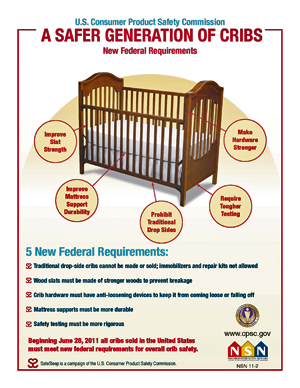 The Consumer Product Safety Commission (CPSC) has implemented comprehensive new safety standards for baby cribs. The standards ban the sale of dangerous drop-side cribs and improve safety testing to prevent infant strangulation deaths.
The Consumer Product Safety Commission (CPSC) has implemented comprehensive new safety standards for baby cribs. The standards ban the sale of dangerous drop-side cribs and improve safety testing to prevent infant strangulation deaths.
The regulations took effect this week after the recall of over 11 million unsafe cribs since 2007. Over the past decade, at least 32 infants have suffered suffocation and strangulation deaths in defective baby cribs.
The CPSC is calling the new regulations the “most stringent crib safety standards in the world.” The standards are important for parents to learn because the CPSC reports that even cribs without drop-sides are unlikely to meet the new standards.
The standards work to prevent infant deaths in several ways. In addition to banning the manufacturing or sale of drop-side cribs, the standards strengthen mattress supports and crib slats, make testing more rigorous and require crib hardware to have anti-loosening devices.
All importers, distributors, manufacturers and retailers must comply with the regulation immediately. Many large retailers such as Target and Walmart say they have already stopped selling drop-side cribs.
Certain businesses using cribs have a grace period for compliance: in-home child care services, child care facilities, rental companies and public accommodations such as hotels.
The CPSC said parents who want to keep using drop-side cribs can contact their manufacturer and ask if they offer an immobilizer. These devices secure drop-sides to prevent the crib from separating and causing an infant injury.
Parents with other types of cribs are urged to check their cribs as well. One of the reasons other cribs are unlikely to comply is the new standards require stronger wood and other materials. Parents who continue to use their existing cribs are urged to monitor recalls on the CPSC website at www.cpsc.gov.
Read More
Supreme Court Ruling in Defective Seat Belt Case Victory for Consumers
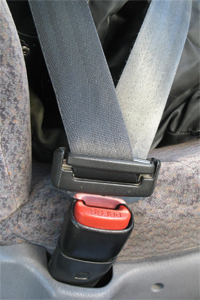 In a unanimous 8-0 ruling, the U.S. Supreme Court recently held that the Federal Motor Vehicle Safety Act does not preempt product liabililty claims brought under state common law for defective seat belts.
In a unanimous 8-0 ruling, the U.S. Supreme Court recently held that the Federal Motor Vehicle Safety Act does not preempt product liabililty claims brought under state common law for defective seat belts.
In 1993, the Federal Motor Vehicle Safety Standard (FMVSS) 208 required lap/shoulder belts in all vehicle seats except certain rear seats in vans. In the regulation, the National Highway Traffic Safety Administration (NHTSA) specified lap/shoulder belts were safer, but requiring them in all seat positions would not be cost-effective. The authorizing statute provided that compliance with the standard did not exempt manufacturers from common law liability.
Thanh Williamson died in a car accident while traveling in a Mazda mini-van that fell under this regulation. She was wearing a lap-only seat belt. Her family sued Mazda, alleging the company had a duty under state law to install the safer lap/shoulder safety belts. The case is Williamson v. Mazda Motor of Am., Inc.
A California trial court dismissed the lawsuit, finding the Federal regulation preempted the claims. An appellate court affirmed, relying on the ruling in Geier v. American Honda Motor Co. In that case, the court determined that the preemption applied in an auto defect claim involving the manufacturer’s failure to install air bags.
In Williamson, the Supreme Court distinguished between the regulations governing air bags and seat belts and said the seat belt regulation explicitly encouraged car manufacturers to install lap/shoulder belts. NHTSA supported the plaintiffs in an amicus brief, arguing that its policy objectives would have been met if the lap/shoulder belts had been installed.
Without a regulatory objective blocking installation of the lap/shoulder seat belts, the Court held that the auto manufacturer could not claim preemption based on the Federal agency’s judgment of cost-effectiveness. Such a judgment does not signify preemptive intent in most Federal safety standards, the Court said.
The Court’s ruling was a victory for consumers in the United States. Having the right to bring claims against manufacturers for defective products is not only a vital way to compensate people injured or killed by the defective products; product liability cases are also a strong force for the improvement of safety in consumer products.
Read More
Two Bicycle Recalls To Watch For As Weather Warms
By Sam Segal
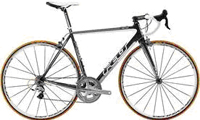 After months of high snow banks, Massachusetts residents are eagerly awaiting the arrival of spring, when they can return to outdoor activities like gardening and bicycle riding.
After months of high snow banks, Massachusetts residents are eagerly awaiting the arrival of spring, when they can return to outdoor activities like gardening and bicycle riding.
If you’re a cyclist, the U.S. Consumer Product Safety Commission announced a few bicycle recalls you may want to note before the warm weather comes.
Felt Bicycles Recall
Felt Bicycles has recalled their model 2011 F3, F4, F5, and F75 bikes due to a problem with the bicycle fork (the part of the frame that connects the handle bars to the front wheel and allows for steering and balance). The forks on these defective bikes have a danger of breaking, causing the rider to possibly lose control, have a bike accident and suffer personal injuries.
Owners of these Felt bicycles are instructed to stop using the defective bikes immediately and contact their local dealer (866-433-5887) to receive a free inspection and repair.
Novara Fusion Bicycle Recall
REI has recalled their Novara Fusion bicycles with serial numbers U95Y07321, U96Y28393, and sequentially from U96Y28876 – U96Y29128 due to a problem with the bicycle fork. The forks on these defective bikes have a danger of separating from the alloy steerer tube, causing the rider to possibly lose control, have a bike accident and suffer personal injuries.
Owners of these REI bicycles are instructed to stop using the defective bikes immediately and contact their local dealer (800-426-4840) to arrange for a replacement fork to be installed free of charge.
Read More
Defective Space Heaters Recalled
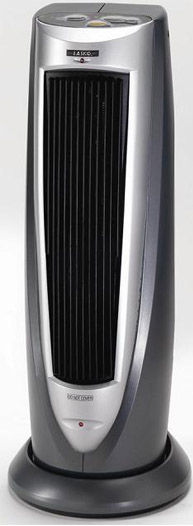 As consumers look to space heaters to stave off the winter chill, a large manufacturer has recalled over 100,000 defective units from the shelves.
As consumers look to space heaters to stave off the winter chill, a large manufacturer has recalled over 100,000 defective units from the shelves.
Lasko Products, Inc. of West Chester, Pennsylvania recalled 107,500 defective space heaters this week in cooperation with the U.S. Consumer Product Safety Commission. An electrical connection in the base of the unit can overheat, causing it to melt and expose the electrical connection.
Lasko received 36 reports of electrical connection overheating with no reports of injury. There were 18 reports of minor burn damage to floors or carpets.
Two defective space heater models were involved in the product recall. The Lasko Model 5540 was sold at Sam’s Club and other retailers from September 2002 through early 2004. The Air Kind Model 8540 was sold primarily through W.W. Granger Inc. from late 2002 to 2004.
Consumers are advised to stop using the defective space heaters immediately and contact Lasko for a free replacement.
If you are using another space heater, please visit the website of the Boston product liability lawyers at Breakstone, White & Gluck. Click here for our home heating safety tips.
Read More

